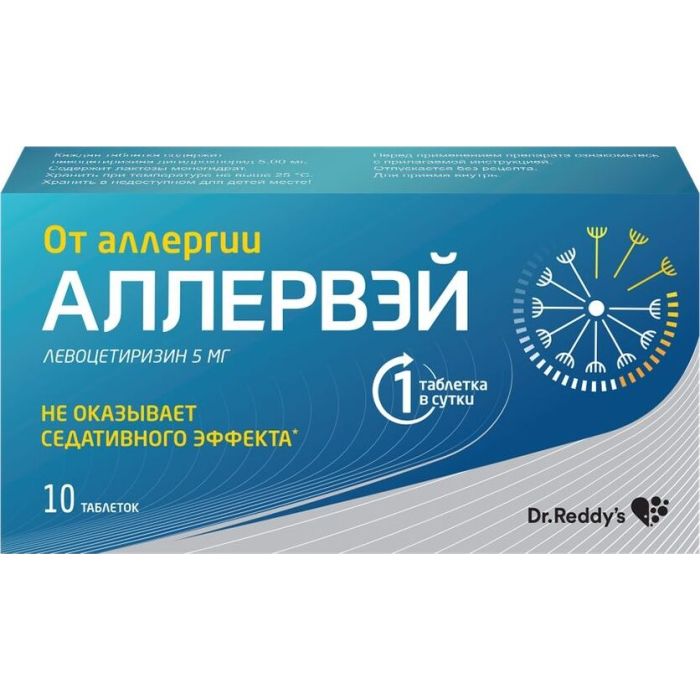Allerway tab. p / o film. 5 mg # 10
Package quantity, pcs:
ten
thirty
Category
Allergy
Scope of the medicinal product
General
Release form
Tablet
Manufacturer country
India
Package quantity, pcs
ten
Structure
Each film-coated tablet contains:
active substance: levocetirizine dihydrochloride 5.00 mg
excipients: lactose monohydrate 88.00 mg
microcrystalline cellulose 34.10 mg
colloidal silicon dioxide 1.60 mg
magnesium stearate 1.30 mg
film sheath: Opadry white OY 58900 (hypromellose (5 cP) 62.5%, titanium dioxide (E171) 31.25%, macrogol-400 6.25%) 3.25 mg.
pharmachologic effect
Pharmacotherapeutic group: antiallergic agent - H1-histamine receptor blocker.
ATX code: R06AE09
Pharmacological properties
Pharmacodynamics
Levocetirizine (R), an enantiomer of cetirizine, is an inhibitor of peripheral H1-histamine receptors.
Levocetirizine has a pronounced antihistamine and antiallergic effect.
It affects the histamine-dependent phase of an allergic reaction, reduces the migration of eosinophils, reduces the permeability of the vascular wall and limits the release of inflammatory mediators.
Levocetirizine prevents the development and facilitates the course of allergic reactions, has antipruritic and antiexudative effects.
Virtually no effect on cholinergic and serotonin receptors, in therapeutic doses does not have a sedative effect.
Pharmacokinetics
The pharmacokinetics of levocetirizine changes linearly.
Suction
After oral administration, the drug is rapidly and completely absorbed from the gastrointestinal tract.
Food intake does not affect the completeness of absorption, although its rate decreases.
In adults, after a single dose of the drug in a therapeutic dose (5 mg), the maximum concentration (Cmax) in the blood plasma is 270 ng / ml and is reached after 0.9 hours, after repeated administration at a dose of 5 mg - 308 ng / ml.
Equilibrium plasma concentration (Css) is reached after 2 days.
Distribution
Levocetirizine is 90% bound to blood plasma proteins.
The volume of distribution (Vd) is 0.4 l / kg.
Bioavailability reaches 100%.
Metabolism
Less than 14% of the drug is metabolized in the body by N- and O-dealkylation (in contrast to other antagonists of H1-histamine receptors, which are metabolized in the liver by the cytochrome system) to form a pharmacologically inactive metabolite.
Due to the limited metabolism and lack of metabolic inhibitory activity, the interaction of levocetirizine at the metabolic level with other substances is unlikely.
Withdrawal
In adults, the half-life (T1 / 2) is 7.9 ± 1.9 hours, the total clearance is 0.63 ml / min / kg.
About 85.4% of the taken dose of the drug is excreted by the kidneys unchanged by glomerular filtration and tubular secretion
about 12.9% - through the intestines.
Features of pharmacokinetics in selected patients
Patients with impaired renal function
In patients with renal insufficiency (creatinine clearance (CC) < 40 ml / min), drug clearance decreases and T1 / 2 is lengthened.
In patients on hemodialysis, the total clearance is reduced by 80%, which requires a change in the dosage regimen.
Less than 10% of levocetirizine is removed during a standard 4-hour hemodialysis procedure.
Indications
Allerway, film-coated tablets, 5 mg is indicated in adults and children from 6 years of age and older with:
treating symptoms of allergic rhinitis, including perennial (persistent) and seasonal (intermittent) allergic rhinitis, and allergic conjunctivitis, such as itching, sneezing, nasal congestion, rhinorrhea, watery eyes, conjunctival hyperemia
hay fever (hay fever)
urticaria
other allergic dermatoses, accompanied by itching and rashes.
Contraindications
Hypersensitivity to the active substance, cetirizine, hydroxyzine, any piperazine derivative or to any excipient of the drug.
Lactase deficiency, lactose intolerance, glucose-galactose malabsorption.
Terminal stage by
Name ENG
ALLERWAY
Clinical and pharmacological group
Blocker of histamine H1 receptors.
Antiallergic drug
ATX code
Levocetirizine
Dosage
5mg
Structure
Each film-coated tablet contains: active ingredient: levocetirizine dihydrochloride 5.00 mg
excipients: lactose monohydrate 88.00 mg
microcrystalline cellulose 34.10 mg
colloidal silicon dioxide 1.60 mg
magnesium stearate 1.30 mg
film sheath: Opadry white OY 58900 (hypromellose (5 cP) 62.5%, titanium dioxide (E171) 31.25%, macrogol-400 6.25%) 3.25 mg.
Indications
treating symptoms of allergic rhinitis, including perennial (persistent) and seasonal (intermittent) allergic rhinitis, and allergic conjunctivitis such as pruritus, sneezing, nasal congestion, rhinorrhea, lacrimation, conjunctival hyperemia
pollinosis (hay fever)
hives
Quincke's edema
other allergic dermatoses, accompanied by itching and rashes.
Storage conditions and periods
At a temperature not higher than 25 degrees.
Expiration date: 2 years
INN / Active ingredient
levocetirizine
Contraindications
Severe renal failure (CC below 10 ml / min)
children under 2 years of age
hypersensitivity to levocetirizine.
Specifications
Category
Allergy
Scope of the medicinal product
General
Release form
Tablet
Manufacturer country
India
Package quantity, pcs
ten
Scope of application
Allergology
Minimum age from
6 years
Way of introduction
Through the mouth
Vacation conditions
Without recipe
Brand name
Dr.
Reddy's
The amount of the dosage form in the primary package
10 pieces.
Primary packaging type
Blister
Type of consumer packaging
Pack of cardboard
Anatomical and therapeutic characteristics
R06AE09 Levocetirizine
Dosage form
Film-coated tablets
Dosage (volume) of the substance in the preparation
1 tab .: levocetirizine dihydrochloride 5 mg
Expiration date in days
730
The target audience
Children
Package weight, g
twenty
Mode of application
:
The tablet should be taken orally, without chewing and with a liquid, regardless of the meal. < br> Adults and children over 6 years old < br> The daily dose is 5 mg (1 tablet) once. < br> Duration of taking the drug < br> In the treatment of seasonal (intermittent) rhinitis (the presence of symptoms less than 4 days a week or their total duration is less than 4 weeks), the duration of treatment depends on the duration of the symptoms treatment can be stopped when symptoms disappear and resumed when symptoms appear. < br> In the treatment of perennial (persistent) allergic rhinitis (symptoms of more than 4 days a week and their total duration of more than 4 weeks), treatment can be continued during the entire period of exposure to allergens. < br> The doctor sets the course of treatment for pollinosis.
Pharmaco-therapeutic group
:
Antiallergic agent - H1-histamine receptor blocker
Information on technical characteristics, delivery set, country of manufacture

